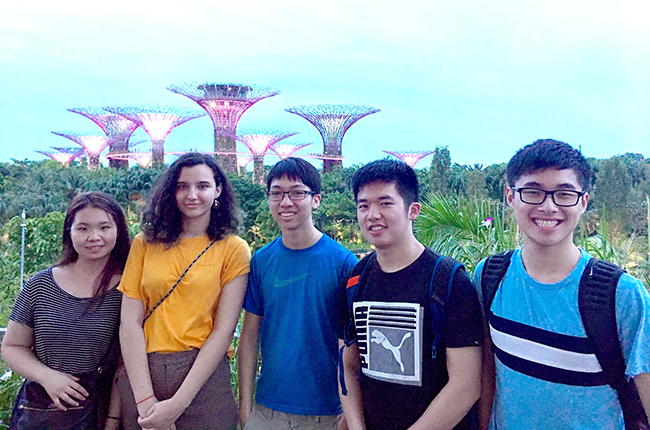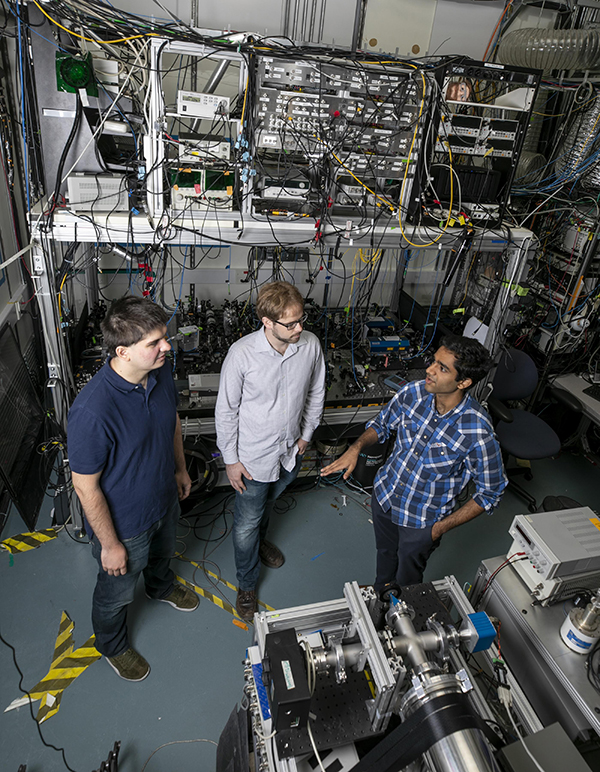The University of Toronto’s Faculty of Applied Science & Engineering offers students exciting opportunities to study and research abroad, with many different programs, destinations, and time frames available. Dean of Engineering, Chris Yip, has been moving towards creating global opportunities for all U of T engineers, with the goal to have every U of T Engineering student participate in an opportunity abroad before graduation.
“It really is about building a global community and experience for everyone,” says Dean Yip. As a founding member of the International Engineering Science Consortium (amongst schools such as UC Berkeley and National University of Singapore) living up to its motto of Engineers for the World (E4TW), there is no better program for global opportunities than U of T Engineering Science!
But what’s the advantage of studying or working abroad?

It’s Just a Cool Thing to do:
Traveling abroad will broaden your horizons, let you explore new locations, and give you different perspectives from around the world. It’ll almost certainly be out of your comfort zone – and that’s great! It’s the only real way to create meaningful change in yourself. Most students return from studying abroad with a new view of their education and their place in the world.
Gain Professional Advantages:
In an increasingly interconnected world, having some global experience is advantageous for your career. You can expand your network, meet with industry partners, learn cultural differences, work with different divisions of your company, and more. If you were a global conglomerate who needed to do business around the world, who would you rather hire: an engineer who had never left their home country, or one who had traveled to three continents? Past surveys show that 83% of hiring managers in Canada agree that employees who have traveled understand the global marketplace, have knowledge of other cultures, and are more competitive applicants.
Develop Global and Cultural Appreciation:
The world is a huge place with countless natural wonders and urban communities to explore. Studying abroad lets you gain global competence – the ability to appreciate and understand different global perspectives and cultural diversity in a way others cannot.
Opportunities Abroad for U of T Engineering Students
If you have questions about exchange programs and research abroad, please contact Don Newton, Engineering Science Curriculum and Research Officer (curric.engsci@utoronto.ca).
ESROP – Global is a summer research opportunity at a university abroad and is unique to Engineering Science students. Successful applicants choose one of many research universities around the world partnered with EngSci, then spend the summer traveling to this destination while helping conduct research with the university. From the midwestern United States to countries such as Thailand, ESROP – Global students have had incredible academic and travel experiences. To learn more, check out our Research Opportunities blog post or read ESROP Student Stories.

Students who have secured their own research opportunities at any institution outside U of T can apply for ESROP – ExOp to help fund their summer research. To learn more, check out our Research Opportunities blog post or read ESROP Student Stories.
Pictured is Mohit Verma (EngSci Physics 1T9), during his ESROP – ExOp fellowship at Harvard. He worked on the Advanced Cold Molecule Experiment, in collaboration with groups from Harvard, Yale, and Northwestern. This gave him “a unique experience as [he] was able to partake in a world-class experiment while also working with people from different universities and backgrounds.” Furthermore, “spending the summer at Harvard really expanded [his] network and has allowed [him] to make many friends who might be future colleagues, collaborators and contributors in the field.”

U of T’s Centre for International Experience (CIE) provides many opportunities for international exchanges, including the CIE’s Summer Research Exchange Program (SREP). Visit the Learning Abroad website to find information on available exchanges.
Internship opportunities can be found all over the world. Different countries specialize in different industries, so getting jobs abroad can help introduce you to career paths in diverse fields, while interacting with globally significant companies. During long-term internships, you’ll spend months abroad, which will allow you to immerse yourself deeply in other cultures and even become fluent in a new language!
Your four month-long summer breaks are a perfect time to seek out internships, as many companies have summer internship programs. Through company websites, platforms such as LinkedIn, and networking events such as career fairs or design team competitions, you can identify and apply for tons of internships across the world.
Your 12-16 month Professional Experience Year (PEY Co-op) is also an excellent time for an international opportunity. Many non-Canadian companies consider U of T PEY students when hiring for internships, so as a U of T engineer, you have the potential to take your year of co-op almost anywhere in the world. From big tech in the United States, to aerodynamics in the United Kingdom, to space robotics in Germany, and beyond, EngScis complete amazing PEYs all over the world.
Joining design teams is an excellent way to gain not only practical engineering experience, but global experience as well. Design teams compete against universities from around the world at competitions hosted worldwide. For example, U of T Robotics for Space Exploration (RSX) competes in the University Rover Challenge (URC). In 2024, they were one of 38 teams to qualify for finals at the Mars Desert Research Station (MDRS) in Utah out of 102 teams. In Utah, they competed against teams from Australia, Bangladesh, Canada, Colombia, India, Japan, Mexico, Poland, Turkey, and USA.
For design team competitions, you can travel to different places and interact with diverse teams from around the world. As a result, you can learn a lot about engineering from a global perspective, while spending time in some cool places.
These competitions often attract large international companies as sponsors. Students who network effectively can sometimes earn themselves interviews for these top companies.
Note that while design teams try to take as many members to competition as possible (including first years), there is often a limit due to budget or other constraints. To maximize your chances of attending, make sure you invest time and effort into your design teamwork, and demonstrate your engineering and collaborative competencies through your interactions with your team leads. While at the competitions, be outgoing and interact with different teams and sponsors.
EWB is a Canadian non-profit organization focused on improving life in Sub-Saharan African countries. They tackle a wide variety of problems, from social injustices and business development to improving water and sanitation access for communities. As an undergraduate engineer, you can apply for a Junior Fellowship in EWB, which can mean helping with EWB work locally or traveling with the organization to Africa to help cultivate development.
Even though you’ll still be in Toronto during this course, Praxis III is an engineering design course in which you will apply your learnings from Praxis I and II in a global context based on the United Nations Sustainable Development Goals. You and your team will develop mechatronics projects to address global engineering opportunities. Last year, teams developed projects to improve quality of life in Sub-Saharan Africa and Southeast Asia. In 2021, teams collaborated with business students from Georgia State University to develop solutions for organizations in Nigeria, Ghana, Thailand, Uganda, and South Africa.
Again, although you probably won’t leave Toronto for this opportunity, this Minor will teach you how engineers can interact with global issues. The required courses focus on topics such as sustainability, social sciences, globalization, and policy. This Minor requires an application which opens in March with multiple information sessions during this time.
Questions?
If you have questions about exchange programs and research abroad, please contact Don Newton, Engineering Science Curriculum and Research Officer (curric.engsci@utoronto.ca).
